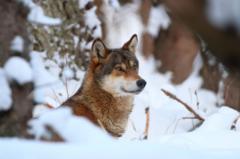In the picturesque Carpathian mountains of Romania, shepherd József Rácz grapples with the challenges of protecting his flock of 500 ewes from formidable predators like wolves and bears. Each year, he reports losing several sheep to these carnivores, underscoring his reliance on 17 trained dogs for defense. However, monumental changes loom on the horizon as a European Commission proposal could lead to the decline of over 45 years of strict protections for grey wolves.
Set against the backdrop of winter's first snowfall, this proposal aims to transition wolves from Annex II (strictly protected) to Annex III (protected) of the Bern Convention. The implication is profound: it would permit individual EU countries to establish annual quotas for wolf culling, potentially undermining the stability of wolf populations that have surged from 11,000 in 2012 to over 20,000 today.
The Commission contends that as wolf populations swell, they increasingly endanger livestock, justifying the proposed regulatory shifts. Conversely, wildlife advocates argue that enhanced protective strategies—such as the utilization of trained sheepdogs—could mitigate livestock losses without dismantling existing safeguards. They emphasize the ecological role wolves play, which includes controlling deer and wild boar populations that can wreak havoc on forests and farmlands.
During a recent gathering of wildlife experts in Baile Tusnad, sentiments against wolf hunting echoed throughout the discussions. Biologist Michal Haring highlighted the need for a balanced ecosystem, noting wolves play a crucial role in suppressing diseases like African swine fever, which impacts livestock far more severely than wolves.
Research underscores this perspective; a recent EU report revealed that only a minuscule fraction—approximately 0.065%—of Europe’s sheep and goats fall victim to wolves annually. Furthermore, the report pointed out that there have been no fatal wolf attacks on humans in four decades.
In promoting understanding and tolerance for wildlife, Laurent Schley from the Luxembourg government asserted, “If we expect countries like India to safeguard their tigers, we ought to do the same for our wolves.” Schley remarked on Luxembourg’s conducive environment for wolves and acknowledged the need for intervention if wolves threaten livestock or public safety.
Yet, the stakes are particularly high for farmers like József Rácz, who views wolves as intelligent and opportunistic hunters. He advocates for stricter measures to protect livestock, sharing a harrowing experience of losing his beloved guard dog, Moody, to wolf attacks. "One wolf can wreak havoc—if they manage to infiltrate my flock, it can lead to the loss of dozens of sheep in one encounter," he lamented.
As discussions on wolf management unfold, the question remains: will Europe prioritize agricultural security or the ecological importance of maintaining wolf populations? The outcome of this pivotal decision could redefine relationships between humans and wildlife across the continent.


















